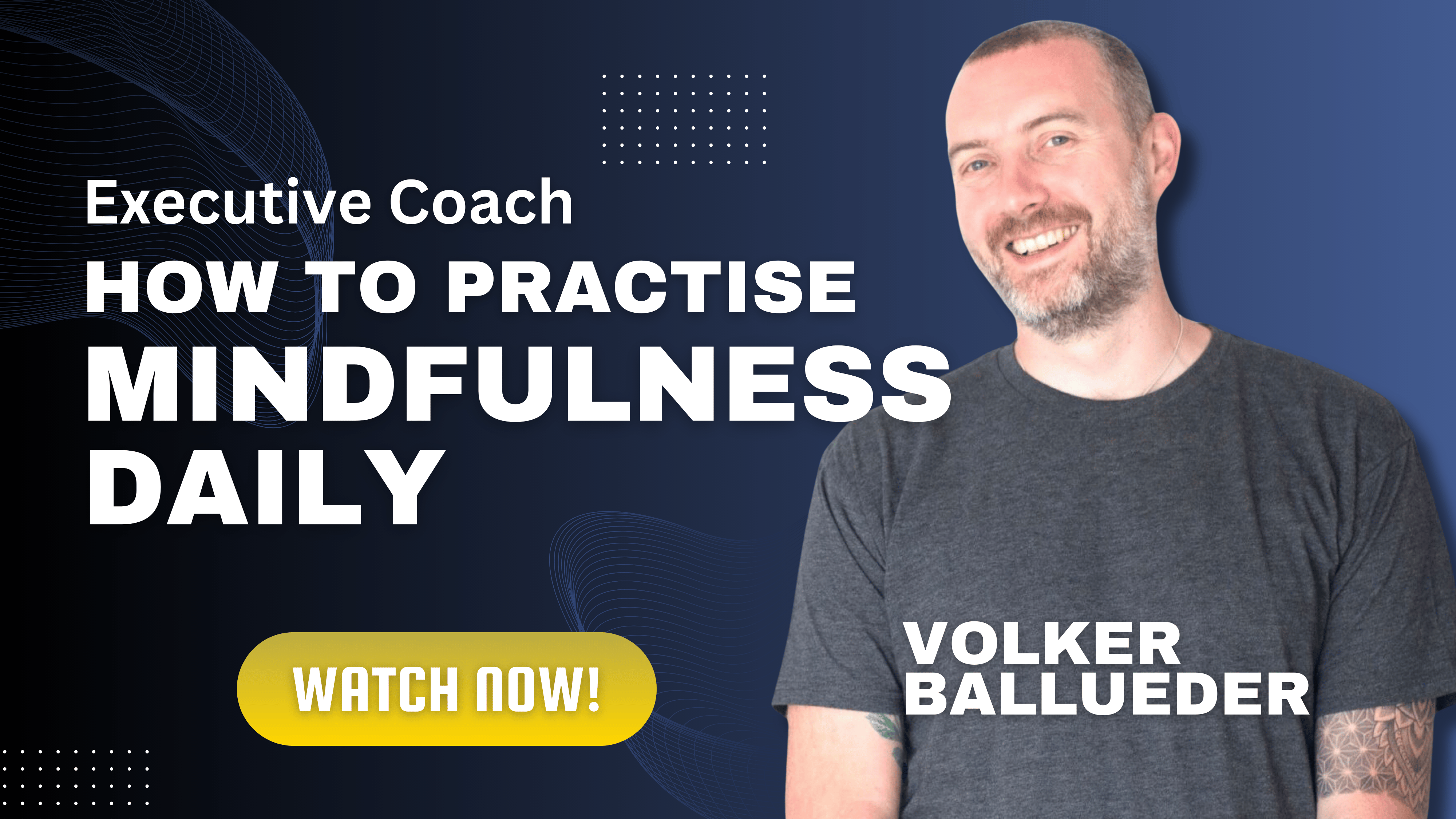Feeling overwhelmed by daily stress?
What if I told you that just a few minutes of mindfulness each day could transform your life? Imagine staying calm during a hectic meeting, being fully present with your family, or even sleeping peacefully through the night.
These benefits and more are within your reach through mindfulness. Many executives feel constantly stressed and distracted. It’s tough to stay focused with so many demands on your time and energy.
The pressure to meet targets, manage teams, and drive revenue can be overwhelming.
Long hours and constant connectivity mean you’re always on, leaving little time to recharge.
You might find yourself jumping from one meeting to the next, barely having a moment to breathe.
Emails and messages pile up, and the line between work and personal life blurs.
This constant state of being ‘on’ can lead to burnout, affecting your performance and overall happiness.
Mindfulness helps you stay present, reduces stress, and improves your overall mental health. It’s about focusing on the here and now, which can lead to better decision-making and enhanced productivity.
Often, particularly engineers I am working with, find mindfulness a fluffy word. And maybe it is.
I have seen meditation and mindfulness as tools. I reframe their meaning to help me solve a problem. Call it what you want.
It’s easy to get caught up in the chaos and lose sight of what truly matters. Mindfulness brings you back to the present moment, helping you to handle stress more effectively. It’s not just about feeling calmer—it’s about improving your entire approach to work and life.
Without mindfulness, you risk staying in a cycle of stress and distraction. Over time, this can lead to chronic stress, burnout, and even physical health problems like high blood pressure and heart disease.
Your decision-making suffers, productivity drops, and personal relationships can become strained as you become less present and more irritable. Practicing mindfulness can lead to numerous benefits beyond stress reduction. It enhances your emotional intelligence, improves your body mind connection, making you a more empathetic leader. It can improve your focus and concentration, helping you to get more done in less time.
Additionally, it fosters a greater sense of well-being and happiness, which can improve your relationships and overall quality of life.
What can you do?
Begin your day with a few minutes of mindful breathing. Sit comfortably, close your eyes, and focus on your breath. Inhale deeply, hold for a moment, and then exhale slowly. Repeat this for 5 minutes. It sets a calm tone for your day. Reach out to me for a guide on how to start meditating.
Choose a daily activity like brushing your teeth or drinking coffee. Focus fully on this task. Notice the sensations, sounds, and smells. This practice trains your mind to stay present. That’s being mindful rather than meditating.
Schedule short breaks during your workday. Step away from your desk, take a few deep breaths, and pay attention to your surroundings. These breaks can refresh your mind and increase your productivity.
I have a three step breathing space I teach all my coaching clients that are interested in this. A quick reset to get through the busy day. Something you can do whilst sitting at your desk, or stepping out of the office for a few minutes.
Before bed, spend a few minutes reflecting on your day. Acknowledge what went well and what didn’t without judgment. This helps clear your mind for better sleep.
A gratitude journal would enhance that process, but more about that next time maybe. Ask me how to write a daily gratitude journal.
Consider using a mindfulness apps like Insight Timer or others. These apps offer guided meditations and reminders to practice mindfulness throughout the day. Most phones now do that too.
I once worked with a sales director who was always stressed and overwhelmed.
This constant stress made it difficult for him to focus, and his team often felt his anxiety, which affected their morale and productivity.
He felt like he was constantly under pressure and couldn’t catch a break.
By incorporating mindfulness into his daily routine, he began to notice significant changes. He started with simple mindful breathing exercises in the morning, took mindful breaks throughout the day, and ended his day with a short reflection practice.
After just a month, he reported sleeping better, feeling more present in meetings, and having more energy throughout the day. This not only improved his work life—making him a more effective and empathetic leader—but also positively impacted his personal life.
He was more relaxed and present with his family, and his overall happiness increased.
Do I need to meditate for hours to see benefits?
No, even 5-10 minutes a day can make a big difference.
Some believe mindfulness is about clearing your mind completely. It’s not. It’s about acknowledging your thoughts and gently bringing your focus back to the present moment.
Is mindfulness only for people who meditate?
No, mindfulness can be practiced by anyone, even if you’ve never meditated before. It’s simply about being present in the moment. There is a difference between mindfulness and meditation, the latter is a practise of mindfulness.
Can I practice mindfulness while doing other activities?
Absolutely. You can practice mindfulness while walking, eating, or even during meetings by focusing fully on the activity at hand.
How long does it take to see the benefits of mindfulness?
Many people start noticing benefits within a few weeks of regular practice. The key is consistency.
Is mindfulness a religious practice?
No, mindfulness is a secular practice that can be integrated into any lifestyle. It’s about mental focus and well-being.
What if I get distracted while practicing mindfulness meditation?
It’s normal to get distracted. When it happens, simply acknowledge the distraction and gently bring your focus back to your breath or the task at hand.
Can mindfulness help with anxiety and depression?
Yes, research shows that mindfulness can reduce symptoms of anxiety and depression by helping individuals manage their thoughts and emotions better. Dr. Mark Williams has done a lot of work around this. As a matter of fact, I was trained to teach mindfulness by a spin off from his mindfulness centre in Oxford.
Today, we covered how to start your day with mindful breathing, practice mindfulness during routine tasks, take mindful breaks, end your day with reflection, and use mindfulness apps. These steps can help you stay calm, focused, and productive.
I encourage you to try these tips and see how they impact your life. If you found this video helpful, please like and subscribe for more tips on improving your leadership and well-being.
Have a look at my video on my YouTube channel.





